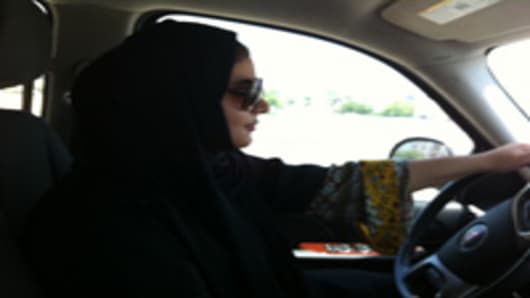Saudi women are planning to take to the streets on Friday, not to push for democratic reforms, as has been a common theme in the Arab Spring, but for the right to drive.
The world’s top oil exporter is the only country in the world where women are not allowed to indulge in what many would consider a basic right.
To be sure, it’s not the first time the Kingdom witnesses calls for change on that front. Many of those who have lived in the Kingdom know all too well the experience of being stuck in a traffic jam only to see what looks like the silhouette of a woman at the wheel, behind the commonly tinted windows.
Outside of the cities, where enforcement across the vast desert landscape is less practical, women can frequently be seen driving cars.
But this time, with the burgeoning reach of social networks and online activism, the campaign has been able drum up a considerable amount of attention. It started off with Najla Hariri, who tweeted about how she had been defying the tradition in the port city of Jeddah.
Then, Manal Al-Sharif was arrested following her courageous move to post a video online of her cruise. More women were detained last week by police, only to be released shortly thereafter on the condition they promise not to drive again. Part of the problem is that there is no clear legal framework actually barring women from driving.
This is an important test for authorities, who have been scrambling to shield themselves of the recent wave of protests in the region. If they do decide to give in, it would reinforce the perception of King Abdullah as much more pro-reform than his predecessors, and provide a glimmer of hope to those doubtful that the current monarchy can survive in its current form.
And as much as the fate of the right to drive campaign would resonate politically in the conservative country, it would also have economic implications. How the empowerment of women stimulates economic development has been the focus of a multitude of studies over decades.
Although he does not expect a change in the current state of women driving, John Sfakianakis, Chief Economist at Banque Saudi Fransi, admits that car sales could see an increase, although not significantly, given that most “already own cars”.
An expatriate male driver is normally hired, which for some working women can represent a sizable chunk of their salaries. Taking the wheel themselves would likely push the annual outflow of remittances lower. According to provisional data by the country’s central bank, expatriates sent home $26.2 billion in 2010, constituting one of the largest of such outflows in the world.
It would also allow the predominantly young population of women to express their personalities more by moving away from the family-oriented cars, typically SUVs, towards sexy luxury rides or cute, flashy city cars, for example.
“I haven’t decided, but I would go for practicality. I want to be as independent as possible”, Dalya Katoah, a 25-year-old Saudi marketing professional in Jeddah, told CNBC.
Already the biggest car market in the Middle East, a report by Business Monitor International (BMI) earlier this year pointed out that the domestic market expansion on the back of rising incomes is a trend “particularly good for the small car market, which has grown markedly over the past year”.
But more cars can prove costly for the already heavily-congested roads of Riyadh and Jeddah.
“It would increase domestic gasoline consumption, which is already surpassing more than 1.5 million barrels daily and could compel the state to establish a public transport system around the country”, Sfakianakis said.
In a bid to withstand the ‘geopolitical contagion’, the Kingdom announced a $133 billion spending package earlier this year, which analysts believe can only be sustained with higher oil prices in the vicinity of $90 per barrel. The IMF now sees this G20 country growing by 6.5 percent this year.
Correction: This version makes clear the quote “It would increase domestic gasoline consumption, which is already surpassing more than 1.5 million barrels daily and could compel the state to establish a public transport system around the country” is attributed to John Sfakianakis, Chief Economist at Banque Saudi Fransi, not to the Business Monitor International report as an earlier version said.


